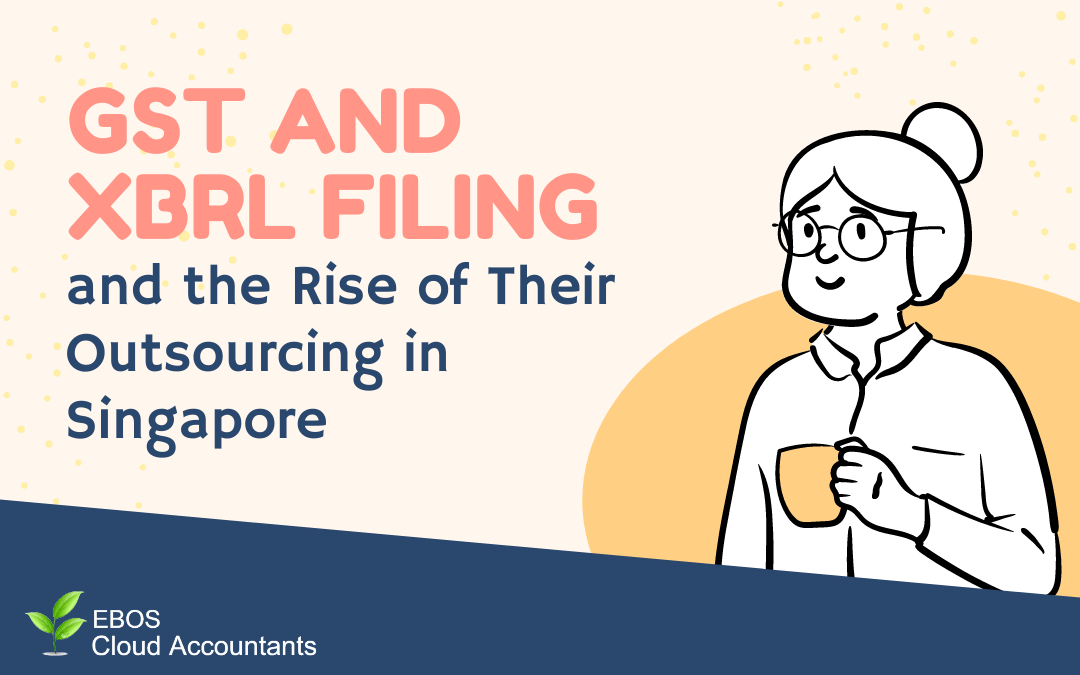GST and XBRL, measures which were implemented to optimize the economy and the financial reporting environment in Singapore, have both given rise to outsourcing in the form of GST services and outsourcing of XBRL filing in Singapore.
GST (General Sales Tax) is an indirect tax collected by businesses and (mostly) levied upon the consumer. The GST in Singapore is currently 7% and was implemented in 1994 primarily for two purposes; to discourage against consumption and to provide a steady stream of revenue through taxes that can be used to lower the strain on direct income and corporate income taxes. XBRL (eXtensible Business Reporting Language) filing requirements were implemented in Singapore in 2007 primarily to increase the flow of corporate and financial information to the government, corporate, local sectors.
Both GST and XBRL filing in Singapore are tedious and data/records heavy tasks which are usually kept in the periphery by most firms because they tend not to impact a companies’ bottom line or immediate goals. However, failing to effectively comply with either of these regulations can cause cascading problems in the form of governmental penalties which can be imposed upon you. This has led to companies outsourcing their GST and XBRL filing responsibilities to lower their administrative and financial burdens and guarantee compliance.
Which Companies Are Required to File for GST and XBRL in Singapore?
You have to register yourself to IRAS (Inland Revenue Authority of Singapore) for paying GST if your company conforms to these mandates:
• Private companies operating locally and selling goods and services locally within Singapore
• Have either an income turnover of over $1 million at the end of the calendar year or prospectively have a projected income turnover of over $1 million within the next 12 months
• GST is not applicable to all zero-rated goods, sales of goods and services abroad, and exempted services
However alternatively, you can choose to voluntarily register yourself to the IRAS to pay GST regardless of whether you meet these conditions or not. You may do so to benefit the national economy and for the added prestige, in front of consumers and investors alike, of being an IRAS registered firm (as all major companies are IRAS registered and have General Sales Tax).
Meanwhile, in 2020, ACRA (Accounting and Corporate Regulatory Authority) have implemented new regulation pertaining to which companies have to file XBRL. All major incorporated companies that do not conform to these requirements have to file their XBRL:
• Companies with an annual revenue of S$10 million or less
• Companies with total assets valued S$10 million or less
• Companies with less than 50 employees
Companies that are failing to meet all the above conditions are required to file their XBRL to ACRA.
How to Register for GST and File for XBRL in Singapore
In this pandemic ravaged world, you can actually register for GST in Singapore online. You have to create your own Corppas account, fill the relevant document depending upon the type of company- whether partnerships, sole proprietaries, etc. – and wait the appropriate amount of time for your registration to be processed. After that you have to make decisions to most effectively deal with GST, such as by either offsetting the weight of the GST to the consumer or take the deadweight by making the price GST inclusive. You then have to keep the records of all transactions and eventually make your GST returns at the end of your accounting period. Being late in any payment or being non-compliant in any other way will cause penalties to be imposed upon your company.
XBRL filing in Singapore is even more complicated. You require trained accountants, well versed with the XBRL reporting language and XBRL tags to record all the information of all financial transactions taken place into the XBRL format and under the appropriate XBRL tags. It requires training and knowledge to file for XBRL in Singapore, and therefore will most likely require either outsourcing or keeping a professional accountant on your payroll.
Benefits of Outsourcing GST and XBRL Filing
Both GST and XBRL filing are tedious tasks that require a large amount of labor from your resident accountants. They need to keep immaculate records of all the financial data in your company, and in the case of XBRL need to switch it into the appropriate format. Due to the difficulty and tediousness of the task, there has been a rise of outsourcing them to specialized firms and there are many benefits of doing so, some of which include:
• Minimize risk of non-compliance: GST and XBRL filing can seem like small problems, however, failing to comply with these requirements can snowball them into a massive issues in the form of penalties which can be imposed upon you. Having a professional specialized firm doing your taxes and XBRL can minimize the risk of non-compliance.
• Minimize expenses: keeping all the records for GST and XBRL and filing for XBRL requires trained accountants and keeping them on your payroll can be expensive. By outsourcing all record keeping and filing tasks to specialized firms you cut down on these costs and only have to pay the small fee of the firm.
• Minimize administrative costs: you have to delegate a certain amount of manpower and focus on the task of record keeping for taxes and XBRL filing. By outsourcing, you remove this delegation and can then focus their energy on other tasks.







